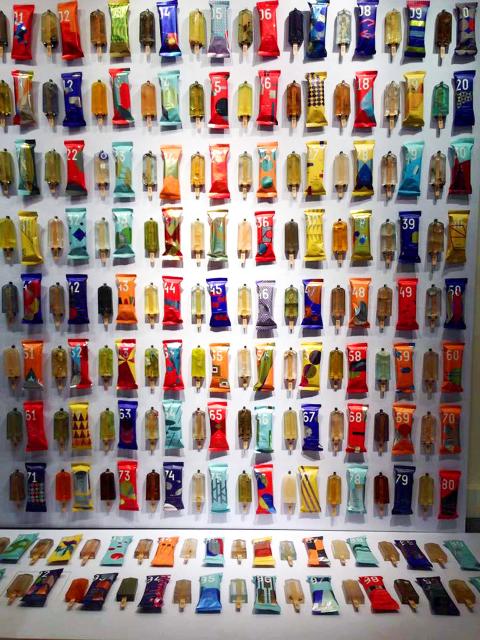Three young artists have made popsicles using water from 100 polluted sources across the nation to draw attention to the degradation of the nation’s water sources.
The “Polluted Water Popsicle Factory” organized by National Taiwan University of Arts visual design students, aims to draw attention to the degradation of the environment by creating a contrast between visual and psychological information, artist Hung Yi-chen (洪亦辰) said.
The trio on Wednesday uploaded a video featuring the popsicles on its Facebook page, after which the number of the group’s followers surged from 7,000 to 11,000, Hung said.

Photo: CNA, provided by the Polluted Water Popsicles Factory
The water samples were taken from sewage drains, rivers, harbors and wastewater pipes around the nation and were slow-frozen into popsicles, each with its own, individually designed wrapper, Hung said.
The water was collected from sampling locations used by water resource bureaus, she said, adding that they numbered the popsicles by sampling location from the north to the south.
Previous campaigns using posters have failed to raise public awareness and the group believes that using visual and psychological tactics to shock the audience might work better, Hung said.
“The stench of popsicle No. 1 from Keelung Harbor was the worst and it left a greasy coat on the bottle. The night market ditches are also pretty gross. A popsicle made from a ditch in Yunlin County was full of bugs, but water from Taitung County’s Chihshang (池上) was comparatively clean,” she said.
The artists experimented by giving popsicles to their classmates, who thought they looked pretty and delicious, but after they were told that they were made of dirty water, they threw them away, she said.
A yellow popsicle Hung showed reporters was made from water infested by the eggs of channeled applesnail, considered one of the world’s worst invasive species by international conservation groups.
Taipei World Trade Center, Exhibition Hall 1 is to showcase polyresin replicas of the popsicles from today through Monday.

Taiwan’s Liu Ming-i, right, who also goes by the name Ray Liu, poses with a Chinese Taipei flag after winning the gold medal in the men’s physique 170cm competition at the International Fitness and Bodybuilding Federation Asian Championship in Ajman, United Arab Emirates, yesterday.

Costa Rica sent a group of intelligence officials to Taiwan for a short-term training program, the first time the Central American country has done so since the countries ended official diplomatic relations in 2007, a Costa Rican media outlet reported last week. Five officials from the Costa Rican Directorate of Intelligence and Security last month spent 23 days in Taipei undergoing a series of training sessions focused on national security, La Nacion reported on Friday, quoting unnamed sources. The Costa Rican government has not confirmed the report. The Chinese embassy in Costa Rica protested the news, saying in a statement issued the same

A year-long renovation of Taipei’s Bangka Park (艋舺公園) began yesterday, as city workers fenced off the site and cleared out belongings left by homeless residents who had been living there. Despite protests from displaced residents, a city official defended the government’s relocation efforts, saying transitional housing has been offered. The renovation of the park in Taipei’s Wanhua District (萬華), near Longshan Temple (龍山寺), began at 9am yesterday, as about 20 homeless people packed their belongings and left after being asked to move by city personnel. Among them was a 90-year-old woman surnamed Wang (王), who last week said that she had no plans

TO BE APPEALED: The environment ministry said coal reduction goals had to be reached within two months, which was against the principle of legitimate expectation The Taipei High Administrative Court on Thursday ruled in favor of the Taichung Environmental Protection Bureau in its administrative litigation against the Ministry of Environment for the rescission of a NT$18 million fine (US$609,570) imposed by the bureau on the Taichung Power Plant in 2019 for alleged excess coal power generation. The bureau in November 2019 revised what it said was a “slip of the pen” in the text of the operating permit granted to the plant — which is run by Taiwan Power Co (Taipower) — in October 2017. The permit originally read: “reduce coal use by 40 percent from Jan.